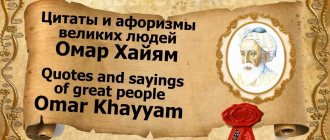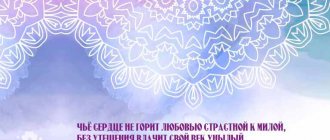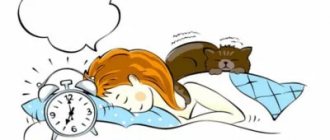Top 10 travel quotes from movies
- See the world around you, experience dangers, overcome them, look through walls, be closer, find each other, feel. This is the purpose of life. © Film “The Incredible Life of Walter Mitty”
- Everyone says that they dream of getting out of here, seeing the world, but when it comes down to it, they won’t stick their beak further than their birdhouse © Cartoon “Fly the Wing”
- To change the world, you need to see it © t\s “Missing”
- - Will you come with me to America?
- Yes, even to Africa. © Brother-2 - — If you had a lot of time on the clock, what would you do?
- I would stop watching. I can say one thing, if I had time, I wouldn’t waste it. © In Time - Life is a tango, in which the main thing is movement. If you stop, the dance will stop, if you stop, life will stop. © Scent of a Woman
- It's the journey, not the destination, that matters. (From the movie “Step Up 3-D”)
- The most enjoyable part of the trip is getting ready. A dog's bark is worse than the dog itself. And a woman is often more beautiful from the back. The sight of me can destroy your dreams. (from the animated film "Spice and Wolf")
- While traveling, it is important not to forget the main thing - when one thing ends, something else begins. From the movie “Love Happens”
- The people you travel with are just as important as the place you travel to. These people can make your trip unforgettable. From the movie “Lost in Translation”
Kursha-2. The site of the murder of a thousand lumberjacks
This story could become the plot of a bloody drama about human stupidity and negligence. In the 30s, in the Ryazan region there was a village called Kursha-2, it was inhabited by workers who cut down and harvested the Meshchera forest. A single narrow-gauge railway connected the remote village with civilization; along it, wood was transported to the regional center. About a thousand people lived in Courche-2: lumberjacks and their families. In 1936, a terrible forest fire broke out near the village, the fire was rapidly approaching Courche-2. At night, a train arrived in the village to save the harvested timber. But the brigade, who saw the scale of the fire with their own eyes, proposed to abandon the wood and, first of all, take out the people - at least women and children. However, management refused: the workpieces first needed to be saved. It took too long to load the timber - the flames approached the village. People were placed on top of logs, the carriages were jam-packed with wood and residents of Curonian II. At that moment they actually signed a sentence and were doomed to a painful death.
When the train approached a small canal three kilometers north of Cursi-2, it was too late: the only way to salvation - a wooden bridge - was already engulfed in flames. People were trapped, flames surrounded them on all sides. The train caught fire.
Eyewitnesses claimed that 1,200 people died that night - almost the entire population of the village: workers, women, children, old people, soldiers. Few were saved - only those who remained in Courche-2 and hid in wells and ponds. Officially, 313 deaths were announced; the media kept silent about the tragedy. The village was partially restored, but after the war it was resettled and abandoned. Today there is an eerie wasteland, a rusting narrow-gauge railway along which the ill-fated train rushed, and a huge mass grave.
Proverbs and sayings about travel, road and tourism
- He who travels learns.
- There is a will for the free, a way for the walker.
- The eyes do not see, so the soul does not know.
- If you want to get to know a person, take a trip with him.
- If you love your son, send him to travel.
- It is not the one who lived longer who knows more, but the one who walked further.
- Dunno lies, but know-it-all runs far.
- Don't be afraid of the road, if only your legs were healthy.
- Anyone who has been to the sea is not afraid of puddles.
- The one who walks will master the road.
- If you go on a journey, you will find companions.
- If you lack the strength, then at least the desire is commendable.
- On the road you can even call your enemy your own father.
- The road is full of riders, and lunch is full of pies.
- If the sail is left without wind, it becomes an ordinary cloth.
- If I don’t go myself, who will go with me?
- If you are sitting in a boat, do not fight with the boatman.
- If you can climb the mountain, don't stay in the valley.
- If you want to go far, start with something close to you.
- It's better to see once than to hear a thousand times.
- He who has seen a lot knows a lot.
- The road is winding - the truth is straight.
- Every step of the way adds a piece of wisdom.
- Whichever people you come to, that’s the kind of hat you’ll wear.
- First shoe your horse, and then figure out the road.
- You eat for a day, but take bread for a week.
- Do everything you can, and leave the rest to fate.
- Home thoughts are not suitable for travel.
- You won't get far with the warmth of the hut.
- A smart friend is half the road.
- Language will take you to Kyiv.
- Where there is a road, there is a way.
- Don't boast about leaving, boast about arriving.
Myasnoy Bor
Another creepy place that attracts looters and black diggers is the Valley of Death, or Myasnoy Bor. This is a village in the Novgorod region, located among huge swamps. The village is ancient - the first mentions of it date back to the 16th century; it received its name during the years of construction of St. Petersburg: meat was supplied to the city from here. But after the Great Patriotic War, the name acquired a bloody connotation, associated with mass slaughter.
Since 1941, the village was under Nazi occupation. In 1942, the Lyuban offensive operation began - heavy fighting took place in the Myasnoy Bor area. The Spanish Blue Division fought on the side of the Germans, the initiative passed from hand to hand with huge losses. The enemy troops were driven back, but thousands of soldiers remained in the swamps of Myasny Bor forever: soldiers of the Red Army, Wehrmacht and Spanish volunteers. Some were buried in mass graves, but most of the soldiers' bodies were never interred. Rotting corpses sank into the swamp and decomposed near the water. Today, Myasnoy Bor is being explored by historians - they tell frightening things: about voices in the forest and strange shadows, the feeling of someone’s presence. Every year, dozens of skeletons and tons of rusty iron are still found here - traces of the meat grinder of the forties. In search of easy money, looters operate from a historical tragedy - they try to dig up awards, weapons, and throw the found remains into the swamp.
We are the children of the big city
He is dear to us, we will live with him. Statuses about the city, with meaning, with love and a touch of cynicism.
***
3. I was born in the last century. In a country that no longer exists. In a city that no longer exists.
***
6. One should not feel pity for small provincial towns, but great respect.
***
8. The most fascinating and interesting thing in the world is cities, the nerve centers of humanity.
***
10. There are many different cities, but they all have one thing in common: Lenin Street, the Pushkin monument and the Ivanov family.
***
11. What are you talking about? What kind of love? Girl, this is Moscow, it’s spiel-willy here, it’s clouded and forgotten.
***
13. A modern city is a place where some people start their day with thoughts of suicide, and others with thoughts of murder.
***
15. Living in big cities, you learn to look at your feet. But you completely forget about the stars.
Military Hospital (Beelitz, Germany)
The abandoned hospital is one of the most beloved horror film directors. Wounded soldiers were taken to this hospital; Adolf Hitler was also treated here. And now it seems that the walls of the building have preserved the groans and screams of the dying, which can be heard.
Special object 101 (Sukhanovka prison)
In the Moscow region, in the city of Vidnoye, there is the Catherine Hermitage - a monastery. In the 30s, on the site of the monastery, the NKVD organized one of the bloodiest prisons in the history of the USSR - Sukhanovka, also known as “Special Object 101”. It was a secret special-security facility for political criminals and repressed security officers - torture and interrogations were carried out here with special care and order. People disliked by the regime were kept in Sukhanovka: ironically, even the famous ruthless People's Commissar Yezhov spent his last days here before his execution.
Sukhanovka was equipped according to a special project: trying to create ideal conditions for bullying people. Cells for prisoners were installed in the fraternal buildings where the monks used to live. In each cell there were tables and stools embedded in the cold cement floor; there was also a board that was lowered from the wall at night, replacing a bed, which was raised and locked at dawn. All the corners in the room were rounded so that the prisoner would not commit suicide by breaking his head on them. The windows have thick, cloudy glass, barred with reinforcement, that does not let in daylight. Does this seem creepy to you? No, this is not the worst thing that awaited the prisoner.
Quote from NKVD order No. 0068 of April 4, 1953:
“...various types of torture were established: beatings, round-the-clock handcuffing with hands twisted behind the back, which lasted in some cases for several months, long-term sleep deprivation, cold and hot punishment cells.”
It is described rather dryly - in fact, in the skill of torture, the security officers outdid the medieval inquisitors. The Soviet poet, publisher and writer Semyon Vilensky, who, as a student, went to Sukhanovka for carelessly reading a poem about Stalin to a friend, wrote in his memoirs:
“From the neighboring rooms I heard screams, sobs, moans, a woman’s howl, the sound of blows and obscenities from the investigators: “Scald his balls!” Screw!“ But for some reason they didn’t lay a finger on me! Then I learned that for a short time Stalin banned the torture of pregnant women and students. In a word, lucky!”
In 1940, the legendary director Vsevolod Meyerhold was shot - before that he was also tortured in Sukhanovka. Only his right hand was left intact so that he could sign the tortured denunciations against his colleagues and the confessional “testimonies” drawn up by the investigator. With this hand he wrote a letter to Molotov so that he would know what was going on at “Special Object 101”:
“They beat me here, a sick 65-year-old man: they put me face down on the floor, beat me on my heels and back with a rubber band; when I was sitting on a chair, they beat my legs from above with the same rubber, with great force... In the following days, when these parts of the legs were filled with profuse internal hemorrhage, then these red-blue-yellow bruises were hit again with this tourniquet, and the pain was such, that it seemed that boiling water was being poured onto the painful sensitive places of my legs, and I was screaming and crying in pain... My nervous tissues turned out to be located very close to the body, and my skin turned out to be tender and sensitive, like a child’s, my eyes were capable of shedding streams of tears. Lying face down on the floor, I discovered the ability to squirm and writhe and squeal like a dog being beaten by its owner.”
Today, there are not pleas for mercy, but prayers: in the 90s, the monastery was again transferred to the Russian Orthodox Church. A historical museum is located on the site of the prison buildings. However, this place still emanates death and horror. According to various sources, from 1938 to 1952, approximately 35 thousand people became prisoners of a torture prison.








